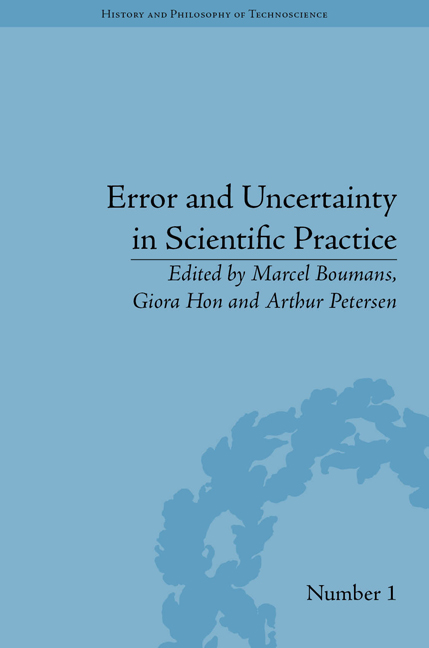Book contents
- Frontmatter
- Contents
- Acknowledgements
- List of Contributors
- List of Figures and Tables
- Introduction
- 1 The Lack of a Satisfactory Conceptualization of the Notion of Error in the Historiography of Science: Two Main Approaches and Shortcomings
- 2 Experimental Knowledge in the Face of Theoretical Error
- 3 Learning from Error: How Experiment Gets a Life (of its Own)
- 4 Modelling Measurement: Error and Uncertainty
- 5 Handling Uncertainty in Environmental Models at the Science–Policy–Society Interfaces
- 6 Variations on Reliability: Connecting Climate Predictions to Climate Policy
- 7 Order and Indeterminism: An Info-Gap Perspective
- 8 Learning from Data: The Role of Error in Statistical Modelling and Inference
- Notes
- Index
4 - Modelling Measurement: Error and Uncertainty
- Frontmatter
- Contents
- Acknowledgements
- List of Contributors
- List of Figures and Tables
- Introduction
- 1 The Lack of a Satisfactory Conceptualization of the Notion of Error in the Historiography of Science: Two Main Approaches and Shortcomings
- 2 Experimental Knowledge in the Face of Theoretical Error
- 3 Learning from Error: How Experiment Gets a Life (of its Own)
- 4 Modelling Measurement: Error and Uncertainty
- 5 Handling Uncertainty in Environmental Models at the Science–Policy–Society Interfaces
- 6 Variations on Reliability: Connecting Climate Predictions to Climate Policy
- 7 Order and Indeterminism: An Info-Gap Perspective
- 8 Learning from Data: The Role of Error in Statistical Modelling and Inference
- Notes
- Index
Summary
Introduction
The relation between error and uncertainty in measurement is a complex subject, in which philosophical assumptions and modelling methods are variously intertwined. Both the concepts ‘error’ and ‘uncertainty’ aim at keeping into account the experimental evidence that even the best measurements are not able to convey definitive and complete information on the quantity intended to be measured. The pragmatic approach prevailing in the literature on instrumentation and measurement today often leaves the distinction between error and uncertainty implicit, as it were just a lexical issue in which a single, stable concept is expressed differently. While at the operative level this interchangeability can find some justification, e.g. the rule customarily adopted for the analytical propagation of errors and uncertainties is indeed the same, whether such concepts are alternative or complementary is a particularly important topic, also because of the claimed current ‘change in the treatment’ of the subject, ‘from an Error Approach (some times called Traditional Approach) to an Uncertainty Approach’.
In this chapter, after having introduced the problem and presented the general background of our analysis in the context of the realist versus instrumetalist opposition in philosophy of science (pp. 80–2), we propose a solution by exploiting the concept of models as mediators between the informational level of the propositions and the ontological level of the world (pp. 82–4).
- Type
- Chapter
- Information
- Error and Uncertainty in Scientific Practice , pp. 79 - 96Publisher: Pickering & ChattoFirst published in: 2014



